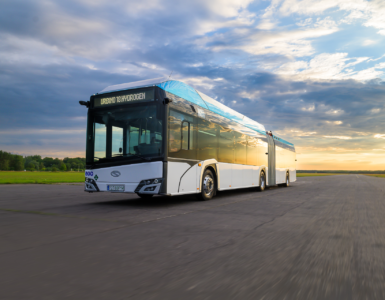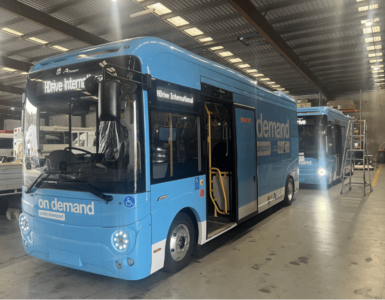Why the future of long-haul heavy trucking probably includes a lot of hydrogen.
The climate challenge requires that we decarbonize our global transportation systems. To meet this requirement, the purported solution for some time now has been “electrify everything.” Technical experts and the climate-concerned public alike have long pushed the idea that the future will be one of clean electricity that powers just about all aspects of our life.
And, I bought in…at least for a time. It wasn’t until I began studying the details surrounding the challenges of putting a battery into a car, truck, or container ship that I realized that things are much more complicated than ascribing to the aspirational motto.
To be clear, batteries will probably make great sense for certain elements of trucking. In fact, well-known companies in the EV space, such as Tesla, have a product on the horizon to address medium-haul, 300-500-mile, operating ranges. However, specifically for long-haul routes, there is a technology more suited to the task – hydrogen fuel cell.
🔥 What about we co-host a webinar? Let's educate, captivate, and convert the hydrogen economy!
Hydrogen Central is the global go-to online magazine for the hydrogen economy, we can help you host impactful webinars that become a global reference on your topic and are an evergreen source of leads. Click here to request more details
Fuel cell trucks use the same basic electric drivetrain as battery trucks (and even have a battery) but due to their on-board hydrogen storage, fuel cell trucks have a much longer range, require fewer stops on long routes, can be fueled much faster, and can carry more cargo.
Another major company, Daimler, is actively working with this drivetrain technology, currently testing a new product with operating ranges of 1000 km (625 miles) or more. In short, fuel cell trucks have many of the benefits of diesel-powered rigs, without the harmful emissions.
Before discussing our analysis of the technical and operational merits of hydrogen fuel cell as compared to battery electric drivetrain configurations, it should be noted that while it was not a focus of our modeling, Total Cost of Ownership (TCO) is an important parameter to consider. This is an active discussion area and not all recent analyses come to the same conclusion.
For example, ICCT looked at some elements of TCO, primarily component and fuel costs, and determined that the operating cost of hydrogen fuel cell vehicles will remain high enough to adversely affect market penetration in comparison to battery electric trucks.
On the other hand, a recent paper from NREL concluded the opposite, that a battery electric, long-haul heavy truck (750-mile range, multi-shift, weight-limited class 8 sleeper) will have a higher TCO than its hydrogen counterpart even though the price of hydrogen remains high and fuel cells have a somewhat lower efficiency compared to batteries. This is primarily due to the capital expense of a larger battery and a longer average dwell time, something that costs money. We acknowledge that this is an unresolved debate.
Given that, in this work we look at another dimension of the technology, operational performance – something that has not been examined nearly as closely as TCO, and found that hydrogen fuel cell vehicles have some decided advantages over battery electric configurations for long-haul heavy-duty trucking.
The old aphorism that time is money is particularly true in the freight transport business. After fuel, labor is the costliest part of a trucking company’s budget. Missed delivery dates can also result in penalties to the company, depending on specific contract language. As such, the first reason why much of the long-haul heavy trucking sector will likely be hydrogen fuel cell based is due to time.
A long-haul, Class 8 truck with a 100kg hydrogen tank can be fueled approximately 15 times faster than charging a 1-2MWh battery needed on the battery electric equivalent. Cross-country drive times can take up to 35% less time due to decreased dwell time as well as the smaller number of stops required. This should make hydrogen fuel cell heavy trucks the more appealing option to businesses that are based around moving goods efficiently around the country.
The second reason is that hydrogen fuel cell-powered trucks also have the edge on electric trucks when it comes to cargo capacity. The 1-2MWh battery required for a long-haul truck will be much heavier than a full tank of diesel or a fuel cell configuration, which typically only needs a small battery of 20-100kWh to accompany the hydrogen.
My analysis shows that if you start with a maximum-weight 80,000 pounds, Class 8 truck and assume a battery mass of 4kg/kWh (something that has been achieved in passenger vehicles but is still unproven for the large batteries needed in heavy trucks and the cooling systems that go with them). A hydrogen fuel cell vehicle loses approximately 500 pounds of cargo capacity, whereas a battery electric vehicle would potentially lose around 4,000 pounds, compared to diesel trucks of today.
Furthermore, if we can’t get to a 4kg/kWh battery relatively soon, we can expect larger cargo capacity losses of 8,000–15,000 pounds in the short-term with the battery electric configuration. The smaller battery used in the hydrogen fuel cell configuration would also weigh more in this case, but even in the worst-case scenario it would only lose approximately 1,000 pounds of cargo capacity.
All told, on average, businesses using hydrogen fuel cell trucks will enjoy most of the benefits of reduced emissions, without sacrificing much of the cargo space they need. In fact, their carrying capacity would be comparable to current diesel fleets.
The third reason hydrogen fuel cells may make more sense for the long-haul trucking business is flexibility. Hydrogen fuel cell vehicles have more range than their electric counterparts, expected to reach twice the number of miles per full charge/tank. An all-electric fleet could handle many regional loads, running along a spoke to and from a hub, but a hydrogen fuel cell vehicle could handle regional delivery as well as cover longer routes with little time needed for refueling. A more flexible fleet is one that may earn more for the business.
Finally, it’s also worth noting that the potential advantages to hydrogen fuel cell heavy trucks are not limited to the merits of individual truck performance or cost. Our analysis, which assumes 100% zero-emission vehicle market penetration (either all-fuel cell or all-battery electric) and trucks that are active 24 hours a day, seven days a week, has shown that the required infrastructure buildout for the all-battery electric scenario would need to be very robust in terms of charging station size and power requirements.
Specifically, the electric infrastructure required for large charging stations for long-haul trucks is in the 22 – 28 MW range, and compared to diesel, those charging stations would need to be around 10 times larger to have the space needed for trucks spending hours charging.
On the other hand, the equivalent infrastructure for the all-hydrogen fuel cell scenario is comparatively more similar at approximately 3 times the size of a typical diesel station, though a hydrogen station that dispenses 20-25 tonnes of hydrogen per day would be more expensive and complex. Most of the larger footprint would be needed to house hydrogen storage tanks and compressors at a safe distance from the fuel pumps and other amenities.
To be clear, these numbers are not a projection of infrastructure requirements a few years from now; rather, they serve as estimates of the upper bound of the load on midcentury transportation infrastructure if all diesel trucks on the road were replaced by hydrogen fuel cell or battery electric vehicles.
Now, there are applications where it does make sense to use battery electric trucks over their hydrogen fuel cell counterparts. For shorter trips, say 400-mile roundtrip regional delivery, or for smaller trucks, a battery electric truck compares well to a hydrogen fuel cell vehicle.
Charging infrastructure is also more developed, cheaper, and less complex than hydrogen fueling stations, and the TRL, or technology readiness level, is higher for electric drivetrains since the technology has been on the market for longer. However, specifically for long-haul heavy trucks – which consume 49% of all diesel fuel used by the freight trucking sector in the U.S. and accounts for roughly 13% of transportation GHG emissions, or 211 million tonnes of CO2e per year – the future probably includes a lot of hydrogen.
As I see it, now is not the time to select a single transportation energy source. For trucking, it appears that hydrogen will have some significant advantages, so let’s get busy building that infrastructure in key regions and along key routes. At the same time, let’s develop high power charging stations that can support battery electric heavy trucks and allow for high-speed charging to reduce dwell times.
In short, instead of forcing everything to electrify or everything to use a particular fuel, let’s develop the necessary technology and infrastructure then use it for the appropriate application – including taking advantage of the merits of hydrogen for long haul heavy trucking operation. In so doing, we can accelerate the proliferation of clean energy in the transportation sector, helping to achieve our climate goals and secure our future.
READ the latest news shaping the hydrogen market at Hydrogen Central
Why the future of long-haul heavy trucking probably includes a lot of hydrogen, March 14, 2023








